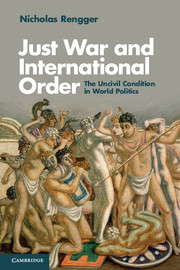Epilogue: a choice not a destiny
Published online by Cambridge University Press: 05 April 2013
Summary
Little children have known always
What Plotinus taught the wise,
That the world we see, we are:
Kathleen Raine, Living with Mystery
The main argument of this book has been that the intertwining of the teleocratic conception of the modern state and the post-sixteenth-century just war tradition has produced, in the modern reworking of the just war, a conception of ‘legitimate force’ that, at least in principle, is much more permissive than is usually supposed. It is permissive to the extent that, rather than acting as a restraint on the use of force by states, or indeed by other agents, it can act as a facilitator, even a driver, for such use. In the specific context of international order after the Cold War, and especially after 9/11, I have suggested that such a permissive conception of force has had extremely malign consequences and that, notwithstanding the always changing contexts of international politics in the twenty-first century, such malign consequences show every sign of remaining in place and perhaps becoming ever more parlous as the century continues.
- Type
- Chapter
- Information
- Just War and International OrderThe Uncivil Condition in World Politics, pp. 158 - 179Publisher: Cambridge University PressPrint publication year: 2013



